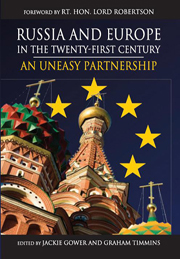Book contents
- Frontmatter
- Contents
- List of Contributors
- Acknowledgements
- List of Abbreviations/Acronyms
- Foreword Russia and Europe
- Preface
- Introduction Russia and Europe: What Kind of Partnership?
- PART 1 Russia looking West
- Chapter 1 Vladimir Putin and Russian Foreign Policy towards the West: Towards a New Realism
- Chapter 2 The ‘Normalization’ of Russian Politics and Europe
- Chapter 3 The Russian Elite Perspective on European Relations
- Chapter 4 Domestic Politics and Foreign Policy Formulation
- Chapter 5 Russia's Regions in Shaping National Foreign Policy
- Chapter 6 The Russian Military and European Security Cooperation
- PART 2 Europe looking East
- PART 3 Partnership in Practice
- Conclusion Russia and Europe: An Uneasy Partnership 289
- Index
- More Titles in this series
Chapter 4 - Domestic Politics and Foreign Policy Formulation
from PART 1 - Russia looking West
Published online by Cambridge University Press: 05 March 2012
- Frontmatter
- Contents
- List of Contributors
- Acknowledgements
- List of Abbreviations/Acronyms
- Foreword Russia and Europe
- Preface
- Introduction Russia and Europe: What Kind of Partnership?
- PART 1 Russia looking West
- Chapter 1 Vladimir Putin and Russian Foreign Policy towards the West: Towards a New Realism
- Chapter 2 The ‘Normalization’ of Russian Politics and Europe
- Chapter 3 The Russian Elite Perspective on European Relations
- Chapter 4 Domestic Politics and Foreign Policy Formulation
- Chapter 5 Russia's Regions in Shaping National Foreign Policy
- Chapter 6 The Russian Military and European Security Cooperation
- PART 2 Europe looking East
- PART 3 Partnership in Practice
- Conclusion Russia and Europe: An Uneasy Partnership 289
- Index
- More Titles in this series
Summary
Introduction
As at many times in its history, Russia has approached a certain turning point, when it has to decide once again about its true identity and actual role in the world. The era of stability during President Putin's first term and the reforms initiated during that period have created the prerequisites for rethinking the future development of the country. Russia is hesitating between modernization and accelerated qualitative growth and the desire to maintain the long-awaited stability and ensure gradual evolution, which is more appropriate for the public and the bureaucratic staff.
Domestic Policy Developments Affecting Russia's External Course
The President seems to support the first model and is prepared to sacrifice his unprecedented rating (around 60 per cent of approval even during the wave of protests in early 2005) to ensure his place in Russian history. As a prudent politician, he is attempting to make compromises in line with reality, but as a lame-duck President, who has to leave in 2008, he recognizes the limited period of time left for substantial achievements. Therefore, the launch of most of the reforms in Russia has been planned for between 2005 and early 2007, in other words, the period when the President can at last convert his incredible popular support into deeds – with the aim of enhancing Russia's ‘competitiveness’ and ensuring its modernization.
Obviously, to perform this noble mission, including the doubling of Gross Domestic Product (GDP) proclaimed in 2003, there is a need for deep restructuring of the Russian economy and social system.
- Type
- Chapter
- Information
- Russia and Europe in the Twenty-First CenturyAn Uneasy Partnership, pp. 57 - 74Publisher: Anthem PressPrint publication year: 2007



